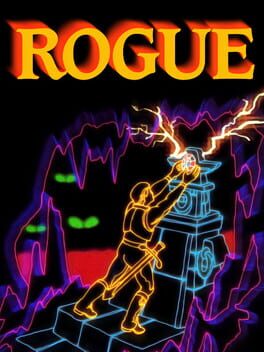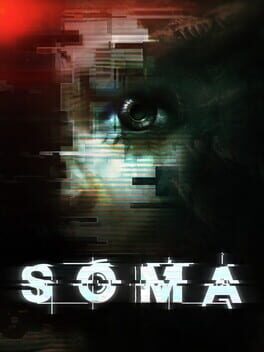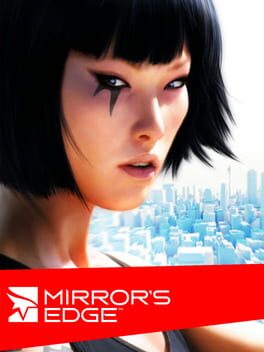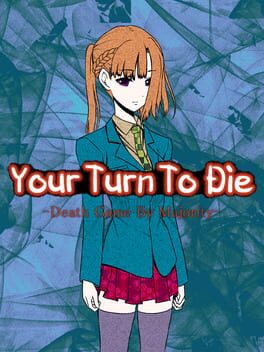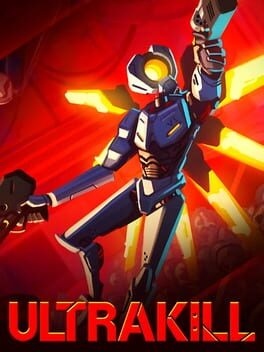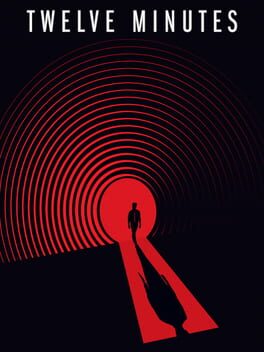szphi
25 reviews liked by szphi
A Short Hike
2019
Rogue
1980
Soma
2015
There are few games I've finished and just sat back and stared at the screen processing what I'd just experienced. Soma however, at the time of writing this is the first game that comes to mind that simply left that kind of incredible impact on me. It's been six years since I played this and I still occasionally think about it.
Equally though thanks to that, Soma is also an incredibly hard game to write about as it's honestly a game best going into blind. It plays like a walking simulator in a science fiction story is the barest of descriptions I am willing to give. The premise to this game as well as the cast of characters you run into are absolutely brilliant and I would say it's implementation is near perfect. The atmosphere of the locales you explore using elements of forms of horror and science fiction intermixed are incredibly detailed and just add to the feeling of dread the game imposes in ways more chilling than a simple jump scare some horror games rely on a little too liberally.
Gameplay wise Soma has your character Simon exploring different areas in a fairly linear fashion solving the odd very basic puzzle as it progresses. Where Soma's downfall that stops it being perfect is the enemy encounters. Whilst some are genuinely scary or tense in a lot of ways, some are more annoying to progress through their design and simply feel like an impediment of what makes Soma such a fantastic experience. This is only amplified by the developers themselves who released a no enemy mode as a free patch after the games release.
These encounters are not why you play Soma though, they aren't what makes the game scary, it's not what makes the game great. The story, characters and atmosphere together are what make Soma such an unforgettable experience and I urge anyone who likes science fiction or horror to give this game a try, preferably knowing as little before hand before going in.
+ Amazing story premise.
+ Fantastic atmosphere.
+ Detailed environments.
+ Great characters and voice acting.
- Enemy encounters are...not great at times.
Equally though thanks to that, Soma is also an incredibly hard game to write about as it's honestly a game best going into blind. It plays like a walking simulator in a science fiction story is the barest of descriptions I am willing to give. The premise to this game as well as the cast of characters you run into are absolutely brilliant and I would say it's implementation is near perfect. The atmosphere of the locales you explore using elements of forms of horror and science fiction intermixed are incredibly detailed and just add to the feeling of dread the game imposes in ways more chilling than a simple jump scare some horror games rely on a little too liberally.
Gameplay wise Soma has your character Simon exploring different areas in a fairly linear fashion solving the odd very basic puzzle as it progresses. Where Soma's downfall that stops it being perfect is the enemy encounters. Whilst some are genuinely scary or tense in a lot of ways, some are more annoying to progress through their design and simply feel like an impediment of what makes Soma such a fantastic experience. This is only amplified by the developers themselves who released a no enemy mode as a free patch after the games release.
These encounters are not why you play Soma though, they aren't what makes the game scary, it's not what makes the game great. The story, characters and atmosphere together are what make Soma such an unforgettable experience and I urge anyone who likes science fiction or horror to give this game a try, preferably knowing as little before hand before going in.
+ Amazing story premise.
+ Fantastic atmosphere.
+ Detailed environments.
+ Great characters and voice acting.
- Enemy encounters are...not great at times.
This makes a really rough first impression, starting off with one of the most bizarrely structured intros I’ve seen from a JRPG, its low budget immediately apparent with the shoddy presentation, and following up with dungeons that I had to drag myself through to stay interested in continuing. Still, I pushed past the first few hours and by the end I guess I didn’t hate it? It does have some good qualities that aren’t apparent at first, which could’ve made for something more compelling if it weren’t let down by its other aspects
The game revolves around a bunch of students trapped in a virtual world called Mobius that’s meant to be an escape from harsh reality, and your group called the “Go-Home Club” tries to fight the Musicians keeping everyone captive and break out. The story itself’s kinda lackluster, but where it shines more than I expected is with the characters. Each get their own scenarios where you can learn more about their trauma and what secrets they’re hiding about themselves, eventually figuring out their true personalities in the real world. In addition you can actually decide to side with the Musicians early on and become one of them as Lucid, secretly working with both teams throughout the game. Some are handled better than others, but it generally does a good job fleshing out not just the main cast between dungeons, but also the villains who get their own scenarios too. I enjoyed this part of the game the most
Though there’s also another aspect called Causality Links, where you can actually talk to any NPC in the game and form a bond with them for passive skills. But instead of just a handful, there’s over 500 walking around each with their own name and quest. Conceptually this is interesting, but unfortunately doesn’t work well since that’s far too many to keep track of and their interactions are shallow. So beyond a couple I didn’t bother with this part much
The combat’s fine if too simplistic. It’s turn based, and you can see how everyone’s turn plays out before you chose it which lets you set up stronger attacks and combos (it won’t show if you miss your attacks though which does happen very often). But there’s not much variation to speak of aside for a few basic skills you’ll unlock as you level up
Unfortunately it gets pretty repetitive simply because of how bad the dungeon design is. Every single one is just a maze of the same environment asset that gets progressively more tedious as it forces you to take the most long winded paths toward your objective. You’re likely to wander aimlessly if you aren’t staring at the map since the pathways go on forever, and it’s made even worse that you’re running into the same type of enemies the entire game. On top of that you have to go through all these dungeons twice if you opt to join the Musicians…
I did like the music at least, especially with how the dungeon tracks only switched to vocals whenever in battles which made them less fatiguing to listen to. And despite the lackluster 3D visuals, the menu and character art was cool
I’d hesitate to recommend it given its flaws, but wouldn’t say my time was wasted. If you can get past the frankly awful first few hours and it's poor dungeons then this might be worth checking out. I’m curious to see how the sequel improves on it
(Update: The sequel's a dramatically better game to the point I would just skip this one and go directly to that lol)
The game revolves around a bunch of students trapped in a virtual world called Mobius that’s meant to be an escape from harsh reality, and your group called the “Go-Home Club” tries to fight the Musicians keeping everyone captive and break out. The story itself’s kinda lackluster, but where it shines more than I expected is with the characters. Each get their own scenarios where you can learn more about their trauma and what secrets they’re hiding about themselves, eventually figuring out their true personalities in the real world. In addition you can actually decide to side with the Musicians early on and become one of them as Lucid, secretly working with both teams throughout the game. Some are handled better than others, but it generally does a good job fleshing out not just the main cast between dungeons, but also the villains who get their own scenarios too. I enjoyed this part of the game the most
Though there’s also another aspect called Causality Links, where you can actually talk to any NPC in the game and form a bond with them for passive skills. But instead of just a handful, there’s over 500 walking around each with their own name and quest. Conceptually this is interesting, but unfortunately doesn’t work well since that’s far too many to keep track of and their interactions are shallow. So beyond a couple I didn’t bother with this part much
The combat’s fine if too simplistic. It’s turn based, and you can see how everyone’s turn plays out before you chose it which lets you set up stronger attacks and combos (it won’t show if you miss your attacks though which does happen very often). But there’s not much variation to speak of aside for a few basic skills you’ll unlock as you level up
Unfortunately it gets pretty repetitive simply because of how bad the dungeon design is. Every single one is just a maze of the same environment asset that gets progressively more tedious as it forces you to take the most long winded paths toward your objective. You’re likely to wander aimlessly if you aren’t staring at the map since the pathways go on forever, and it’s made even worse that you’re running into the same type of enemies the entire game. On top of that you have to go through all these dungeons twice if you opt to join the Musicians…
I did like the music at least, especially with how the dungeon tracks only switched to vocals whenever in battles which made them less fatiguing to listen to. And despite the lackluster 3D visuals, the menu and character art was cool
I’d hesitate to recommend it given its flaws, but wouldn’t say my time was wasted. If you can get past the frankly awful first few hours and it's poor dungeons then this might be worth checking out. I’m curious to see how the sequel improves on it
(Update: The sequel's a dramatically better game to the point I would just skip this one and go directly to that lol)
Jusant
2023
'Jusant' has perfected the climbing genre to such a degree, that it feels intimidating pointing out its most obvious flaws.
Don't Nod's produced a game with incredible level designs and atmosphere— Incredible, yet not perfect.
Inspired by The Legend of Zelda's new emergent gameplay formula taken to the extreme, the lack of UI text will be immersing-- as it will be frustrating, too.
Breathtaking art direction is only so good to the extent it benefits the game it's attached to. The way we have it, strides in graphical achievement by Lumen render interactable objects indistinguishable from those that are not, in especial during dimly lit segments. For a game based around grabbing onto things? You can guess the problem.
Ya see, at the end of the day what Jusant lacks is not vision or engagingly tense mechanics, but intuitive enough level design. Levels designed to make one feel as if they're playing the game, rather than breaking it.
Too many times I found myself exploiting the silliness of its pendulum physics to get me through a phase than wondering the intended path. The problem is not found in the fact that I broke the rules; but instead in the fact that I firmly believe there weren't any.
Don't Nod's produced a game with incredible level designs and atmosphere— Incredible, yet not perfect.
Inspired by The Legend of Zelda's new emergent gameplay formula taken to the extreme, the lack of UI text will be immersing-- as it will be frustrating, too.
Breathtaking art direction is only so good to the extent it benefits the game it's attached to. The way we have it, strides in graphical achievement by Lumen render interactable objects indistinguishable from those that are not, in especial during dimly lit segments. For a game based around grabbing onto things? You can guess the problem.
Ya see, at the end of the day what Jusant lacks is not vision or engagingly tense mechanics, but intuitive enough level design. Levels designed to make one feel as if they're playing the game, rather than breaking it.
Too many times I found myself exploiting the silliness of its pendulum physics to get me through a phase than wondering the intended path. The problem is not found in the fact that I broke the rules; but instead in the fact that I firmly believe there weren't any.
Persona 3 Reload
2024
Mirror's Edge
2008
Massively falls off over time. The first levels are open and bright and fun to jump around in but by the end almost all the parkour takes place in cramped spaces which make the controls feel really clunky. The story is also extremely barebones and uninteresting but I actually didn't mind the combat simply because it was too easy to actually be a nuisance.
Ultrakill
2020
Twelve Minutes
2021
“Is this what other video games are like?” was my girlfriend’s only response after we finished this. It’s the first game she’s beaten that wasn’t on the Nintendo Switch.
Like many people around the world, coronavirus made her into a gamer - a combination of lockdown boredom and watching me play video games every single day of the week convinced her to find out what all the fuss was about. She’d played plenty of Mega Drive and PlayStation as a child, but, like most normal people, fell away from the hobby when school, sex and other pressing responsibilities began to take hold.
The Nintendo Switch is, of course, the ideal console for re-introducing someone to the world of video games - capital-G Gamers may rankle against Nintendo’s minimalist UI for dummies, baby-friendly options and softly-softly in-game tutorials, but watching a newly-minted member of our organisation come to grips with gaming via Nintendo’s safe, friendly little ecosystem makes it undeniably clear what The Big N are up to when they remind you that “A” means “Jump” 10 hours into Super Mario Galaxy. A twenty-second irritation for you is a life-saving clarification for someone who still has to hold the controller up to their face to read the buttons.
Within 18 months, Nintendo has gradually guided my girlfriend through the worlds of Animal Crossing, Super Mario Odyssey Captain Toad, Bowser’s Fury and many other great wee games, eventually climaxing in her getting a near-100% completion stat on Breath of the Wild last week. Unfortunately, as the daily blood-thirst for Yet Another Nintendo Direct proves, Nintendo only make so many games - even for more laid-back fans - and my girlfriend has near enough run the Switch’s first-party well dry.
Which is where the Xbox Series S comes in - while peering through pop-ups and paywalls at countless click-baiting “Best 2021 Games” lists to find new things to enjoy, we found that a lot of interesting stuff that appealed to us - Sable, Forgotten City, Psychonauts 2, Twelve Minutes - were heading straight past the Nintendo Switch and only coming to Xbox and PC. While I have a pretty good PC that could reasonably play all these games, I would never willingly subject a human being I care about to PC Gaming. So we bought an Xbox Series S instead.
In many ways, the Series X|S is the Switch’s antithesis, for worse and for better - a confusing smorgasbord of hardware options that are laser-focused on performance and deeply-integrated online components, with a homescreen that relentlessly bombards you with options, adverts and other worthless media tiles - it’s genuinely amusing that a games console hides its video games in a sub-menu that sits alongside Disney+ suggestions (when you haven’t even downloaded or enrolled Disney+ on the console!) and adverts for games you already own within said sub-menu. Needless to say, starting an Xbox game can be a daunting task for anyone who’s used to just pressing the power button and clicking on a big picture of the game they want to play. Between my “””smart””” TV and the Xbox, I now have to run a gamut of broken advertising just to play a little bit of Blast Corps in glorious 4K. The next generation of gaming is here, folks!
The Series S would be an outright contemptible little device if Microsoft hadn’t essentially mastered their ability to give console players a comfortable PC-like experience of near-infinite diversity in near-infinite combinations, all from the comfort of a controller. This thing has the best multi-generational compatibility of any console I’ve ever owned - surpassing even the mighty Nintendo DS and O.G. PS3. It’s confounding/astounding that I could, technically, if I really wanted, sign in to a workplace Teams call on a device that simultaneously allows me to swap between Halo 2, Daytona USA, Symphony of the Night and Halo Infinite. I could give my daily team brief using a Turtle Beach headset plugged into an Xbox controller while playing Conker’s Bad Fur Day, if I really wanted to! Does anyone want that? I don’t think so, but Microsoft have made it possible, for some reason! The next generation of gaming is here, folks! (If you can play Microsoft Teams on an Xbox console, does that technically qualify it for inclusion in the Backloggd archives? I’d love to read those Top Reviews.)
On a console that neatly demonstrates many of the things that make playing modern video games a surreal Kafkaesque nightmare, Twelve Minutes is more or less a perfect package of everything that’s shit about those video games themselves: repetition of mindless tasks; the banal trial-and-error dragging-and-dropping of [USE] [ITEM] [OBJECT] that has plagued adventure gaming for three decades; trying to click on things that are too small; clicking on wrong things and having to slowly watch wrong things unfold; watching polygonal automatons walk slowly to their destination; watching polygonal automatons bump and jerk against and around each other; watching clunky plot unfold at sub-iceberg paces; watching accomplished actors of stage and screen recite from torn-out pages of school play dialogue; hearing that same dialogue again, and again, and again on your way back to the destination of your next clunky plot point; cognitively-dissonant clashes between gameplay and narrative; and, of course, one of video gaming’s most reliable staples - unnecessary, senseless and gratuitous violence against defenceless women.
A game about a police officer exploitatively wielding his authority to prey on a woman in myriad horrific ways is never gonna come out at the “right” time, but playing Twelve Minutes in the ongoing moment of the Sarah Everard case feels so sickeningly sour. It’s morbidly impressive how quickly the game lets you watch a woman get handcuffed and choked out. It’s even more impressive how quickly the game gives you unprovoked player-driven options for violence against your own wife! The next generation of gaming is here, folks!
Early on in Twelve Minutes, “a prestige mystery-thriller timeloop game” (Annapurna Interactive press release, 2021), we realised you can grab a knife and stab your wife while she sits on the couch reading a book. Don’t worry gamers! We had to do it to gain more precious intel about a pocket watch that helps move the mystery along! It’s wholly justifiable woman-murder! There’s a mystery to solve! When we worked this part out, there was no “aha!” moment that usually comes with solving a puzzle in a video game. Just an instinctive revulsion of “do we have to do this?” - and not in an introspective, meaningful way, like, say, that fateful R2 press at the end of Snake Eater. Just a pained, mindless “ugh” while dragging the knife to the wife. A far cry from turning into a funny little jumping cabbage to collect power moons in Super Mario Odyssey. Video games provide infinite diversity in infinite combinations.
Nonetheless, we persisted on the assumption that the game would address its own inhumanity in pursuit of a greater goal or message. It’s a “prestige” game, after all! This is the kind of high-calibre gaming that only the next generation of video games hardware can provide! Of course, it never did - Twelve Minutes is never interested in examining itself, even though it has all the endlessly looping time in the world to do it. Another example within the prior example - American Husband (Scotland’s James McAvoy) resists the player’s first suggestion to carry out the act of wife-stabbing with a weak-willed “No…” refusal before capitulating on the second attempt. What does that mean, really? I hoped the game was taking a page from Deltarune’s playbook by suggesting that the player and the player-controlled husband were distinct entities in the Twelve Minutes world, but alas - we already established that this game is a portrait of every blemish and pimple on the face of video games. There’s no space for interesting thoughts here! Ignore that cheap gesture in the general direction of drama and get back to stabbing your wife! You need to stab her to get The Facts! You’ll be absolved of your crimes on the next loop anyway.
Fortunately, the game’s incoherent and incompetent tone often comes to your rescue whenever it forces you to do something rotten. Immediately after shanking his wife (for the third time) for having the temerity to read a book on the couch, we commanded our witless hero to sit down and eat his chocolate mousse. He remarked on how tasty it was, then read a book on the couch with his dead wife, behaving more like an auto-piloting Sim than a Serious Protagonist. It was a very good bit of morbidly dissonant ludo-narrative giggling, and a rare moment of joy in a game that is trying so very hard to be mature. Remember the Groundhog Day montage where Bill Murray trial-and-errors his way around diners and offices? All those bits in Edge of Tomorrow where Tom Cruise bit the dust in increasingly sadistic and silly ways? Weren’t they fun! No room for that here. We’ve got women to kick in the ribs!
I’m not opposed to video games and other artworks depicting our ugliest inhumanities, but I feel like it has to be to some meaningful end. Twelve Minutes is so obsessed with presenting itself as maturely as possible that it ultimately comes off as immaturely meaningless as it possibly could - no amount of prestigious acting credits or allusions to brutal murder and rape can save it from coming across like a Christopher Moltisanti spec script. Like a corny mafia movie, Twelve Minutes lets you watch a woman get punched, kicked, choked and stabbed - again, and again, and again, and again, and again (Achievement Unlocked, by the way!) until you’re bored. Then it’ll introduce something about incest, for some reason. The perfect introduction to the world of video games beyond Nintendo’s borders. The next generation of gaming is here, folks!

